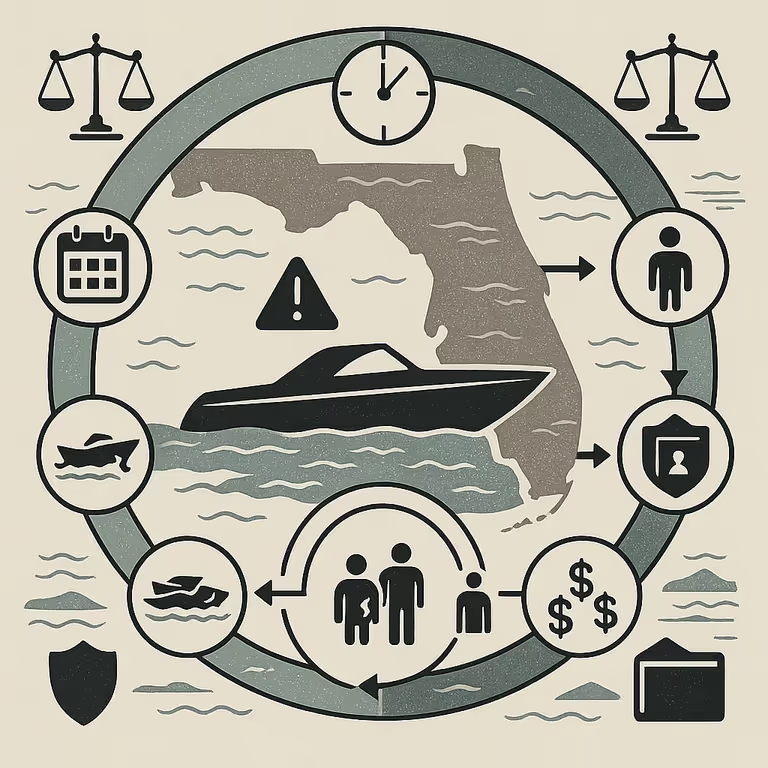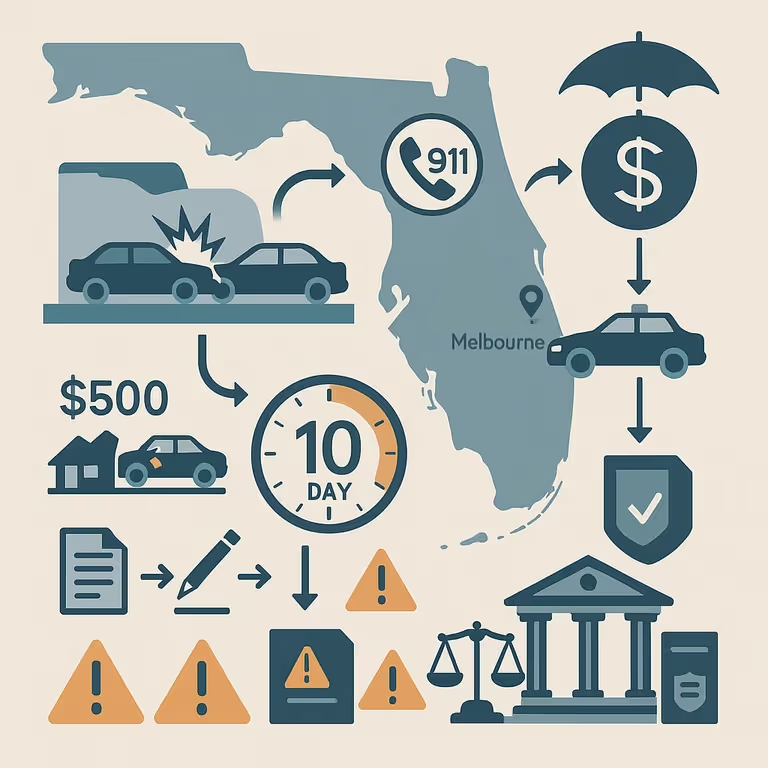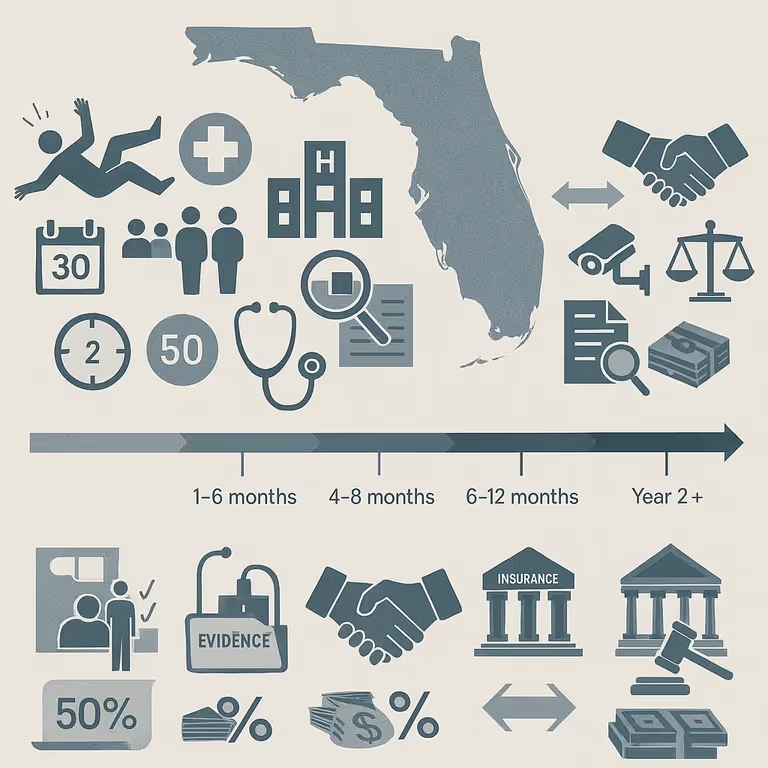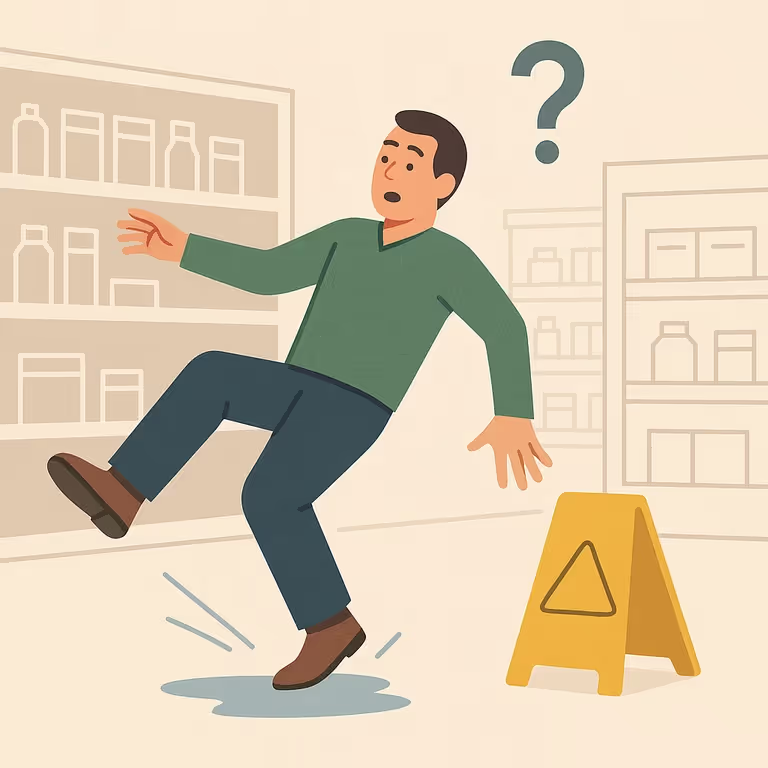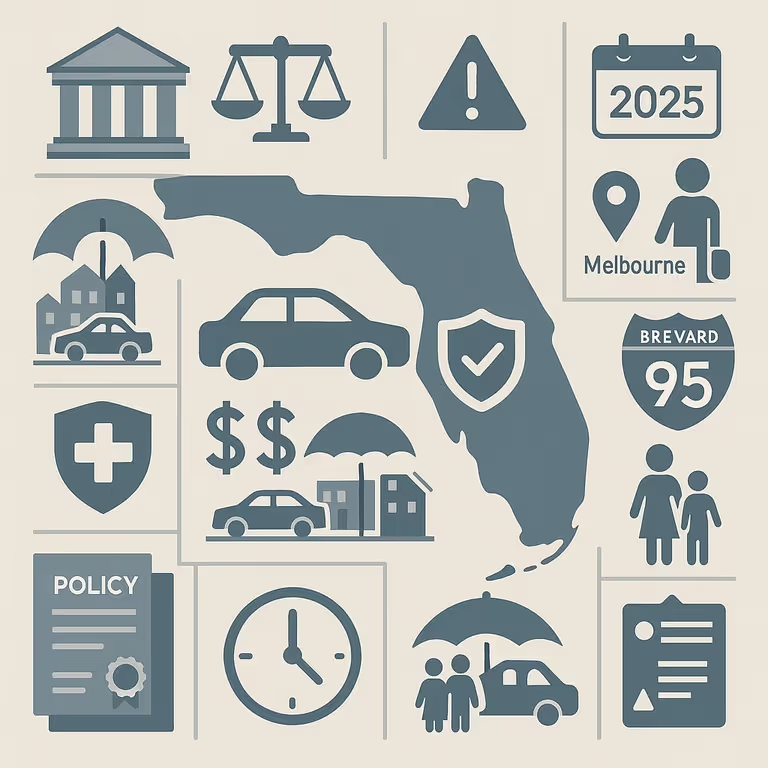Combined Single Limit (CSL) Policies in Florida Truck Accidents: What Victims Need to Know
Learn how Combined Single Limit policies affect your Florida truck accident claim. Melbourne's accident attorneys explain CSL insurance & compensation.
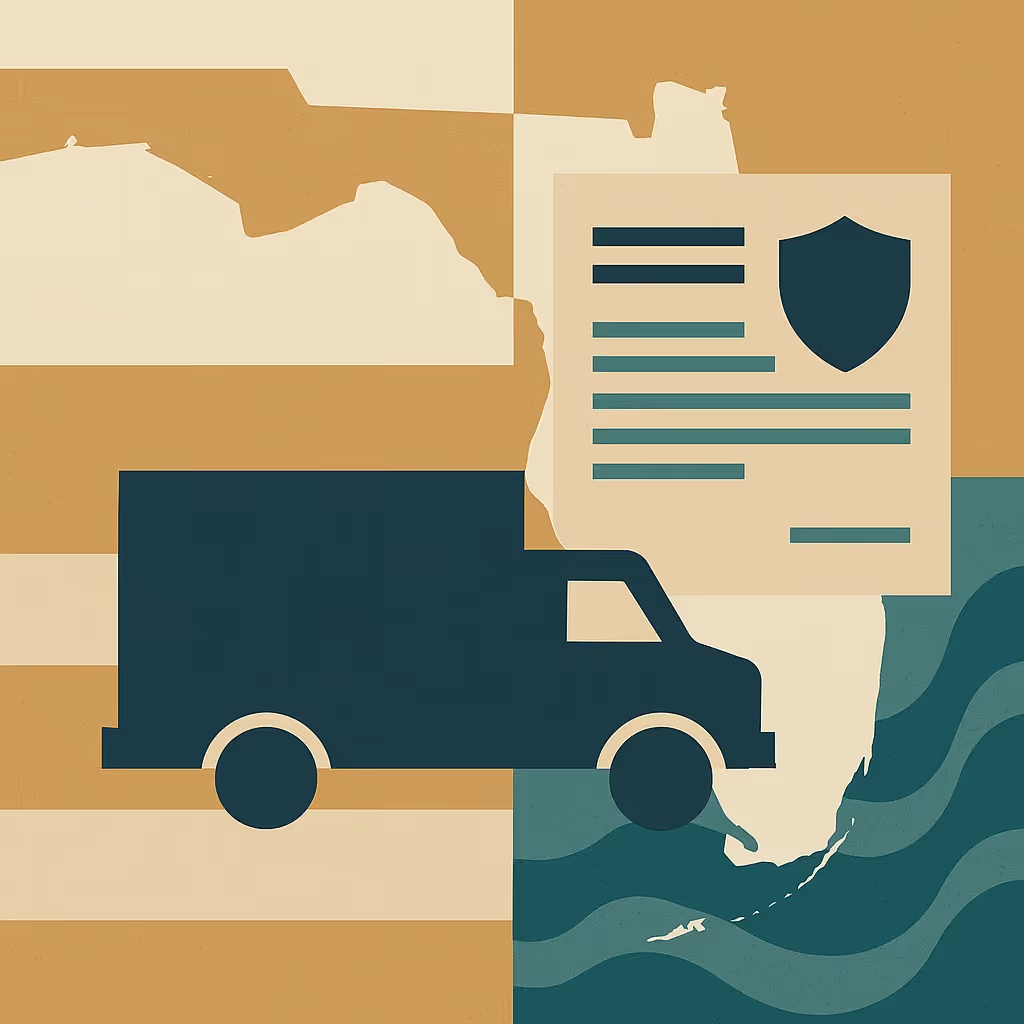
- Unlike split limit policies that cap specific damage types, Combined Single Limit policies provide one flexible total amount for all damages from a single accident, potentially allowing the entire policy limit to be applied toward catastrophic injuries without predetermined allocations.
- Multiple victims in a truck accident covered by a CSL policy must share the total available funds. Although the carrier must evaluate all claims in good faith, a finite CSL pot can be exhausted quickly, so late claimants may recover less.
- Thorough investigation after a truck accident often reveals multiple sources of compensation beyond the primary CSL policy, including excess coverage, umbrella policies, separate coverage for truck and trailer, and potential third-party claims against maintenance companies or brokers.
Worried About Your Injury Case? We'll Review It - Free!
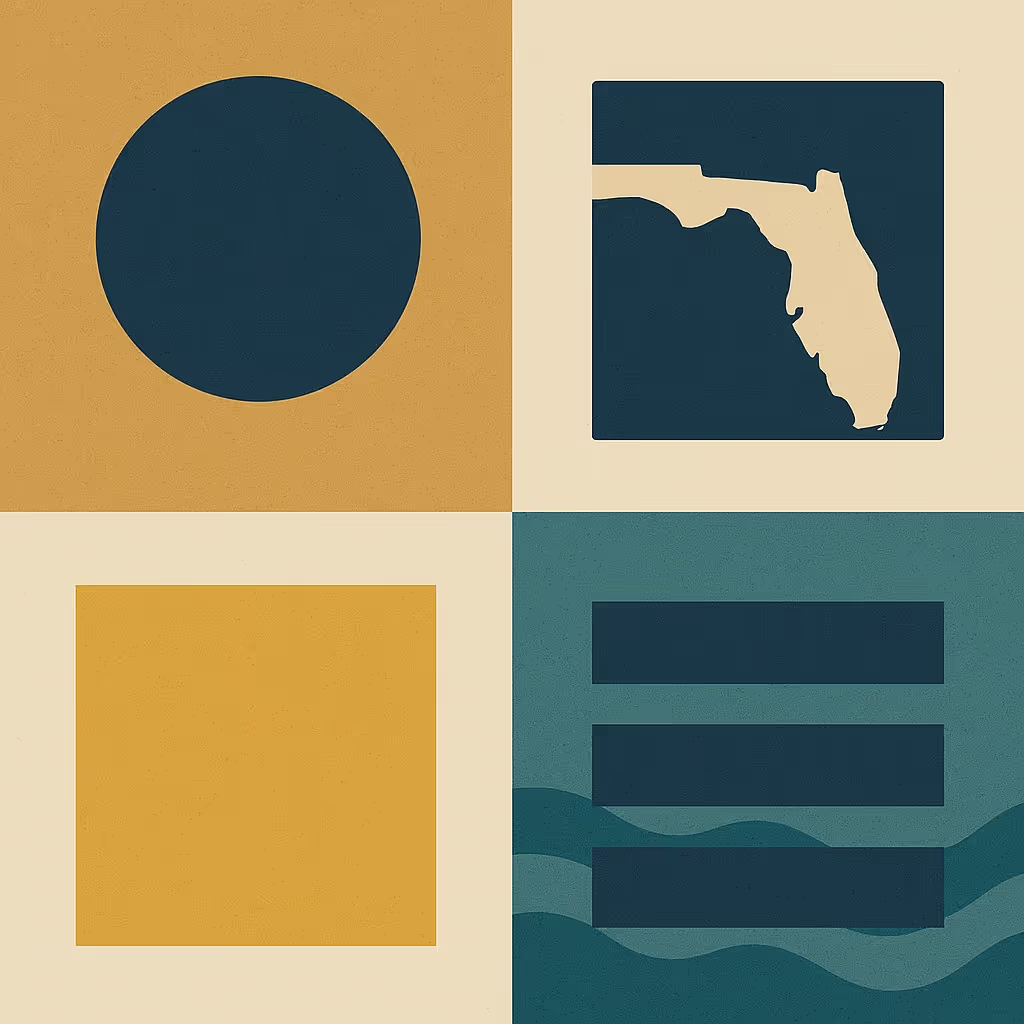

When you've been seriously injured in a collision with an 80,000-pound tractor-trailer on I-95 near Melbourne, your focus is understandably on recovery. But as medical bills mount and income is lost, you'll soon face the complex world of insurance claims—where you might discover the trucking company has something called a "Combined Single Limit" policy. Understanding what this means could significantly impact your compensation.
A Combined Single Limit (CSL) policy is an insurance approach commonly used in the commercial trucking industry. Unlike personal auto insurance that typically sets separate limits for different types of damages, a CSL policy provides a single monetary limit that applies to all damages—both bodily injury and property damage—arising from a single accident, regardless of how many people are injured or properties damaged.
For victims of commercial trucking accidents in Florida, particularly along high-traffic corridors like I-95 through Brevard County, understanding these policies isn't just helpful—it's essential for securing fair compensation. The difference between CSL and other policy types can mean hundreds of thousands of dollars in available coverage for your injuries.
In this guide, you'll learn exactly what CSL policies are, how they differ from split limit policies, what Florida requires from trucking companies, and most importantly, how this knowledge can help you pursue maximum compensation after a truck accident.
What Is a Combined Single Limit (CSL) Policy?
The Basics of Combined Single Limit Coverage
A Combined Single Limit policy establishes one total dollar amount as the maximum the insurance company will pay for all damages resulting from a single accident. This single limit encompasses everything—medical expenses, lost wages, pain and suffering, property damage, and other costs arising from the accident.
CSL policies are particularly common in the commercial trucking industry because they simplify coverage and provide more flexibility for serious accidents where either bodily injury or property damage might predominate. Melbourne truck accident lawyers understand that this flexibility can be critically important in catastrophic injury cases.
The policy is straightforward in concept: a $1 million CSL policy means that $1 million is the maximum the insurance company will pay for all damages combined, regardless of how that amount is distributed among different types of claims.
CSL vs. Split Limit Policies: Critical Differences
Unlike CSL policies, split limit policies specify separate caps for bodily injury (per person and per accident) and property damage. A typical split limit policy might be expressed as 250/500/100, meaning:
- $250,000 maximum for bodily injury per person
- $500,000 maximum for bodily injury per accident (regardless of how many people are injured)
- $100,000 maximum for property damage per accident
The critical difference becomes apparent in severe injury scenarios. With a $1 million CSL policy, the entire million could potentially go toward a single victim's catastrophic injuries. However, with a split limit policy of 250/500/100, an individual's bodily injury compensation would be capped at $250,000—regardless of how severe the injuries are or how much the total policy is worth.
This distinction is particularly important in I-95 truck accident cases where medical costs alone can quickly exceed typical split limit thresholds. When semi-trucks weighing up to 80,000 pounds collide with passenger vehicles at highway speeds, the resulting injuries often require extensive surgeries, long-term rehabilitation, and lifetime care that can cost millions.
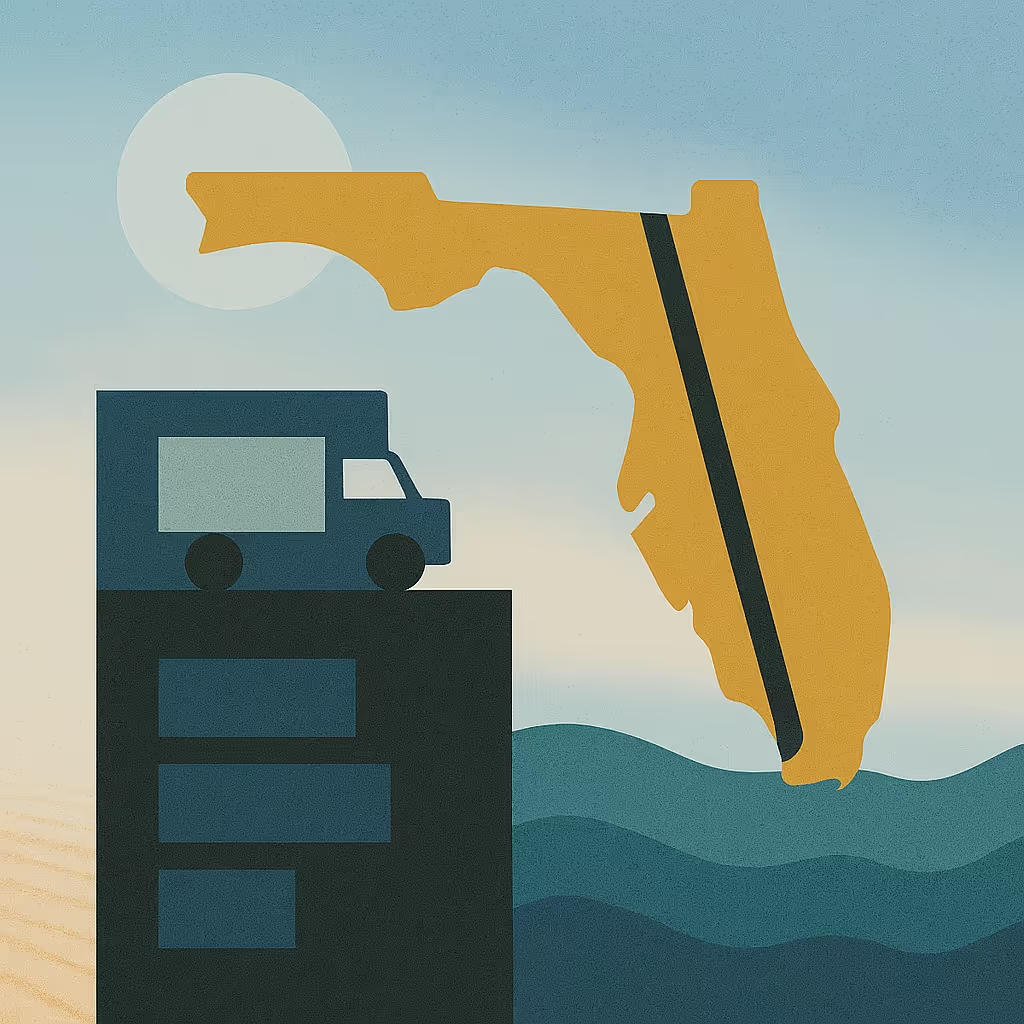
Florida and Federal Insurance Requirements for Commercial Trucks
Florida's Commercial Trucking Insurance Requirements
Florida's insurance requirements for commercial trucks are defined in state statutes and vary based on the type of vehicle and its operations. Florida Statutes 324.021 and 627.7415 set forth financial responsibility requirements for motor vehicles, including enhanced requirements for commercial vehicles.
For certain commercial vehicles and transportation services in Florida, the law requires insurance with limits of at least $5,000,000 combined property damage and bodily injury liability—effectively a CSL policy. This significant coverage requirement recognizes the catastrophic damage that large commercial vehicles can cause.
Our Melbourne commercial vehicle accident lawyers regularly review these policies to identify all available coverage for our clients. Doug Beam has found that many trucking companies operating in Florida carry insurance that exceeds the minimum requirements, particularly those with national operations or hazardous cargo.
Federal FMCSA Requirements for Interstate Trucking
For trucks crossing state lines, the Federal Motor Carrier Safety Administration (FMCSA) establishes minimum insurance requirements that vary based on the type of cargo being transported:
- General freight carriers: Minimum $750,000 in liability coverage
- Household goods carriers: Minimum $300,000 in liability coverage
- Hazardous materials: $1 million to $5 million depending on the materials transported
These federal minimums typically operate as CSL policies for interstate commerce. This means that a truck hauling general freight from Georgia to Florida on I-95 must carry at least $750,000 in CSL coverage, while a tanker carrying hazardous materials might be required to carry $5 million or more.
Brevard County's position along I-95 means many local accidents involve interstate carriers subject to these federal requirements. This creates a complex regulatory environment where both federal and state insurance requirements may apply to your claim.
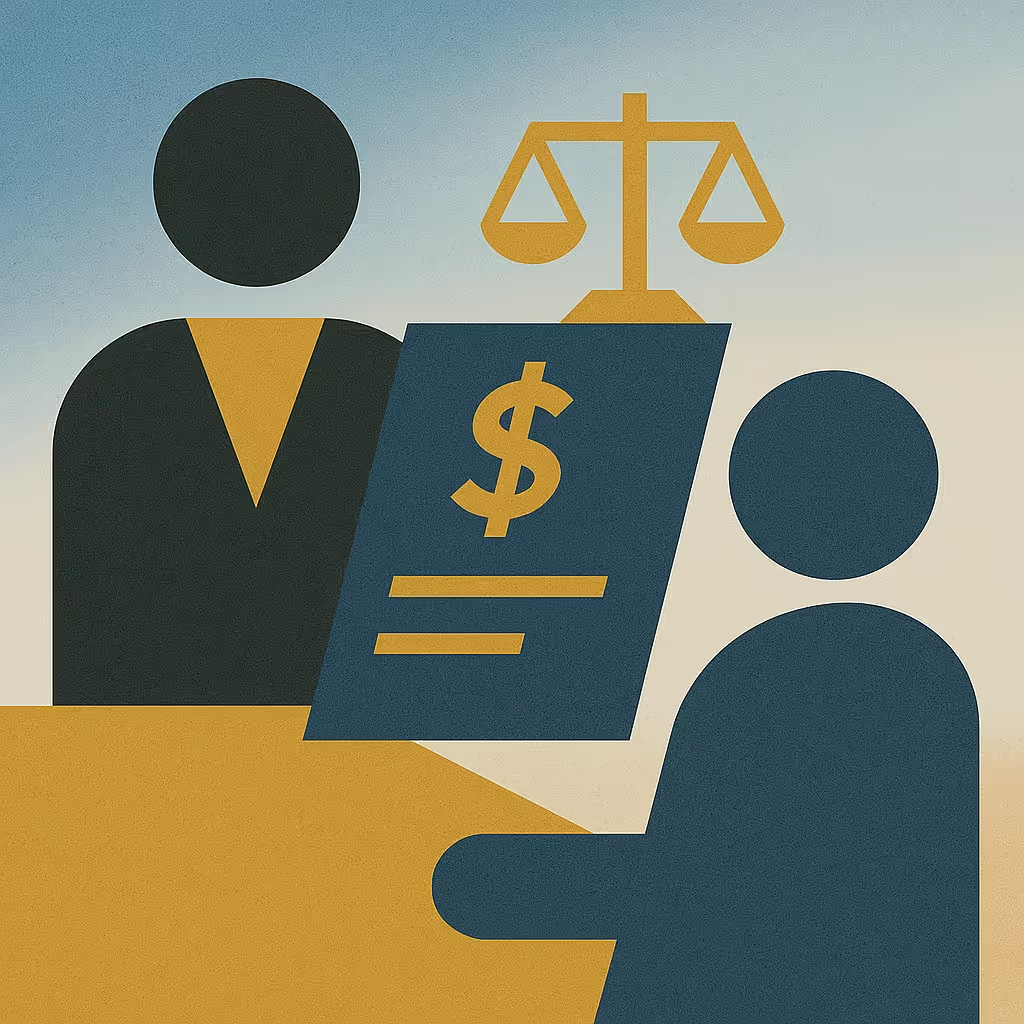
How CSL Policies Affect Your Truck Accident Claim
Benefits of CSL Policies for Accident Victims
When pursuing a claim against a commercial trucking company with a CSL policy, the entire policy limit is available to cover either bodily injury or property damage or a combination of both, without predetermined allocations. This flexibility can be advantageous for victims with catastrophic injuries.
For example, if you suffer a traumatic brain injury in a truck accident and the trucking company has a $1 million CSL policy, potentially the entire $1 million could be allocated to your medical care, lost earnings, and pain and suffering—even if your vehicle damage was minimal.
At Douglas R. Beam P.A., our Brevard County serious injury lawyers are experienced in maximizing compensation from CSL policies in trucking accidents. We understand how to present claims that fully account for both current and future damages, ensuring our clients receive the comprehensive compensation they deserve.
Potential Challenges with CSL Coverage
Despite their advantages, CSL policies present unique challenges in multi-victim accidents. In cases involving multiple injured parties, CSL policies can sometimes lead to a "first-come, first-served" situation where early claimants may deplete the available insurance funds, potentially leaving later claimants with limited recovery options.
This reality creates urgency for victims to secure legal representation quickly after a multi-victim truck accident. The first claims settled often receive the most substantial compensation, leaving diminished funds for later claims—regardless of injury severity.
Experienced truck accident attorneys can identify additional sources of compensation beyond the primary CSL policy, including:
- Excess coverage policies
- Umbrella policies
- Separate policies covering the truck and trailer
- Shipper liability in certain cases
- Third-party maintenance company liability
- Broker liability
Determining Available Coverage in Your Case
Identifying all applicable insurance coverage after a truck accident requires thorough investigation. Commercial trucking operations often involve multiple entities, each with separate insurance policies. An effective investigation may uncover:
- The primary liability policy (typically a CSL policy)
- Excess coverage beyond the primary policy
- Separate policies for the truck and trailer
- The driver's personal insurance (if applicable)
- Insurance covering the cargo
- Umbrella policies covering the entire operation
Many large trucking companies carry insurance far beyond the federally mandated minimums. Discovering these additional coverage sources often requires legal tools like subpoenas, depositions, and document demands—processes that experienced truck accident attorneys handle regularly.
In fatal truck accidents, wrongful death lawyers in Melbourne can help families navigate the complexities of multiple insurance policies while dealing with their profound loss.

CSL Policies and Melbourne/Brevard County Truck Accidents
I-95 Corridor Accidents and Insurance Considerations
The I-95 corridor through Brevard County sees significant commercial truck traffic and associated accidents, making CSL policy understanding especially relevant to local residents. This major north-south artery funnels commercial vehicles through Melbourne and surrounding communities daily, increasing the risk of serious truck accidents.
Many trucking companies operating through Melbourne are interstate carriers with federal minimum CSL policies, while others—particularly those hauling specialized or hazardous cargo—may carry significantly higher limits. Additionally, accidents on I-95 often involve out-of-state trucking companies, adding complexity to insurance claims.
These factors create a unique landscape for truck accident claims in Brevard County. Local drivers involved in truck accidents on I-95 may find themselves dealing with insurance companies and trucking operators based hundreds or thousands of miles away, each operating under different state regulations.
Our fatal truck accident attorneys have extensive experience with catastrophic I-95 crashes involving CSL policies and understand the unique challenges these cases present.
Port Canaveral Commercial Traffic and Insurance Implications
Port Canaveral's commercial activity generates significant truck traffic through Melbourne and surrounding areas, often involving specialized cargo requiring higher insurance limits. As Florida's second-busiest cruise port and a major cargo operation, Port Canaveral attracts commercial vehicles carrying everything from consumer goods to hazardous materials.
Trucks transporting hazardous materials through Brevard County require CSL policies of $1-5 million under federal regulations. These enhanced requirements recognize the catastrophic potential of accidents involving dangerous cargo.
Identifying the specific insurance requirements for different types of commercial vehicles requires knowledge of both the cargo being transported and the regulatory framework governing that particular operation. Local attorneys familiar with Port Canaveral operations and associated trucking activities can better identify all potential sources of insurance coverage.
Working with a Melbourne Truck Accident Attorney
Local expertise matters when dealing with trucking accidents and CSL policies in Brevard County. Melbourne attorneys understand the unique aspects of local trucking operations, insurance requirements, and venue considerations that can significantly impact your case.
A Melbourne-based truck accident attorney brings several advantages to your claim:
- Familiarity with local trucking routes and high-risk areas
- Established relationships with local investigators and accident reconstruction experts
- Knowledge of how local courts handle truck accident cases
- Understanding of both Florida and federal regulations affecting local trucking operations
- Ability to meet with you personally throughout your case
The Melbourne personal injury lawyers at Douglas R. Beam P.A. have decades of experience handling complex commercial vehicle accidents throughout Brevard County. Our local presence and specialized knowledge allow us to build stronger cases for truck accident victims.

Frequently Asked Questions (FAQs)
What is the difference between a CSL policy and a split limit policy?
A Combined Single Limit (CSL) policy provides one aggregate limit for all damages from a single accident. For example, a $1 million CSL policy means $1 million is available for all claims combined, regardless of how that amount is distributed between bodily injury and property damage claims.
In contrast, split limit policies specify separate caps for bodily injury per person, bodily injury per accident, and property damage. A 250/500/100 split limit policy means no individual can receive more than $250,000 for bodily injury, the total bodily injury payments cannot exceed $500,000 per accident, and property damage is capped at $100,000.
The key advantage of a CSL policy is its flexibility—the entire limit can be applied to any type of claim without predetermined allocations.
What are the minimum CSL requirements for commercial trucks in Florida?
For interstate trucking operations (crossing state lines), federal requirements set by the FMCSA include:
- General freight carriers: Minimum $750,000 CSL
- Household goods carriers: Minimum $300,000 CSL
- Hazardous materials: $1 million to $5 million CSL depending on materials transported
For trucks that stay inside Florida, § 627.7415 sets $50,000–$300,000 per-occurrence liability, rising to $1 M–$5 M only when the cargo is hazardous or the vehicle carries passengers for hire.
These minimums vary based on vehicle type, cargo, and whether the operation crosses state lines. Additionally, many commercial carriers maintain higher limits than required, particularly large national companies.
How do I find out the CSL policy limit after a truck accident?
Determining the applicable CSL policy limit typically requires legal intervention. While insurance information may be included in the police report, the full details of coverage—including excess policies and umbrella coverage—usually require formal discovery through the legal process.
Your attorney can:
- Send preservation letters requiring the trucking company to maintain all insurance policy information
- File a lawsuit with specific requests for insurance disclosure
- Utilize formal discovery tools including interrogatories, document requests, and depositions
- Research federal databases that may contain minimum insurance information for interstate carriers
- Investigate corporate structures to identify all potentially responsible entities with separate insurance policies
Without legal representation, obtaining complete and accurate insurance information is extremely difficult.
Can the trucking company's CSL policy limit be exceeded in a severe accident?
Yes, in several ways:
- Many trucking companies carry excess coverage or umbrella policies beyond their primary CSL policy
- Separate legal entities may have independent insurance policies (e.g., the owner of the truck, the trailer, and the cargo might be different companies with separate insurance)
- In cases of gross negligence or statutory violations, direct action against the company's assets may be possible
- Third-party claims against maintenance companies, parts manufacturers, or brokers may provide additional compensation sources
- Under certain circumstances, punitive damages may be available beyond standard insurance coverage
Identifying all potential sources of compensation requires thorough investigation by experienced truck accident attorneys.
What happens if multiple victims are injured in the same truck accident with a CSL policy?
When multiple people are injured in a truck accident covered by a CSL policy, the total coverage amount must be shared among all victims. This often creates a "first-come, first-served" situation where early settlements can significantly deplete available funds.
For example, if a truck with a $1 million CSL policy causes an accident injuring five people, and the first three victims settle for $300,000 each, only $100,000 would remain for the remaining two victims—regardless of injury severity.
This reality makes prompt legal representation essential after multi-victim truck accidents. Experienced attorneys can also identify additional coverage sources beyond the primary CSL policy.
Are medical payments covered separately from the CSL in a truck accident?
Generally, no. In commercial truck insurance policies, medical payments for accident victims typically fall within the CSL amount rather than being provided as separate coverage. This differs from personal auto policies that often include separate medical payments coverage.
However, some commercial policies may include separate Medical Payments or Personal Injury Protection (PIP) coverage that applies regardless of fault. Your personal auto insurance may also provide medical coverage that can supplement your claim against the trucking company.
A thorough insurance investigation is necessary to identify all available sources of medical coverage after a truck accident.
How long do I have to file a claim against a trucking company's CSL policy in Florida?
In Florida, the statute of limitations for personal injury claims for victims injured after Mar 24 2023 is 2 years to sue for negligence; the wrongful-death limit remains two years.
However, waiting until these deadlines approach is extremely unwise, particularly with CSL policies. Crucial evidence may disappear, witness memories fade, and in multi-victim accidents, available insurance funds may be depleted by earlier claims.
Additionally, claims against government entities (such as city or county vehicles) have much shorter notice requirements—sometimes as little as 180 days.
What documentation should I gather after a truck accident to support my CSL policy claim?
If you're physically able, collect the following after a truck accident:
- The truck driver's commercial driver's license information
- The trucking company name, contact information, and USDOT number (usually visible on the truck)
- Insurance information for both the truck and trailer (which may have separate policies)
- Photos of the accident scene, including all vehicles, license plates, damage, and road conditions
- Photos of your injuries
- Contact information for all witnesses
- The police report number (and request a copy when available)
- Medical records documenting all treatments received
- Employment records showing missed work and lost wages
- A journal documenting your recovery process and how injuries affect daily life
An attorney can help gather additional evidence, including the truck's electronic logging device (ELD) data, driver qualification files, maintenance records, and corporate insurance policies.
Conclusion
Understanding Combined Single Limit policies is crucial for anyone involved in a commercial truck accident in Florida. These policies offer important flexibility in how insurance funds are allocated between different types of damages, potentially allowing more comprehensive compensation for catastrophic injuries.
However, the "first-come, first-served" nature of CSL policies in multi-victim accidents creates urgency for securing legal representation. Additionally, the complex web of federal and state regulations governing commercial trucking insurance requires specialized knowledge to navigate effectively.
For Melbourne and Brevard County residents injured in truck accidents, working with attorneys experienced in commercial trucking claims can make a significant difference in compensation outcomes. From identifying all applicable insurance coverage to negotiating effectively with commercial carriers, specialized legal representation helps level the playing field against well-funded trucking companies and their insurers.
If you've been injured in a truck accident, contact the experienced truck accident lawyers at Douglas R. Beam, P.A. for a free consultation at (321) 723-6591 to discuss your accident and potential compensation under the trucking company's CSL policy.
Sources
- PKB Law - CSL in Vehicle Accidents
- Progressive Commercial Insurance
- Auto Justice CSL Insurance Guide
- Investopedia - Combined Limits
- Florida Statutes 324.021
- FMCSA Insurance Requirements
- FL Commercial Truck Insurance
- FL Senate Bill 1181 Analysis
- MWL Multiple Claims Guide
Not Sure What To Do Next? We Can Help – Fast & Free.
Worried About Your Injury Case?
We'll Review It - Free
Don’t miss an article
Florida law, local insights, and the occasional dog pic.
Delivered straight to your inbox.
More articles
Browse all articlesFree Case Review
Get a complimentary review of your case

.webp)
.png)
.png)
.png)

